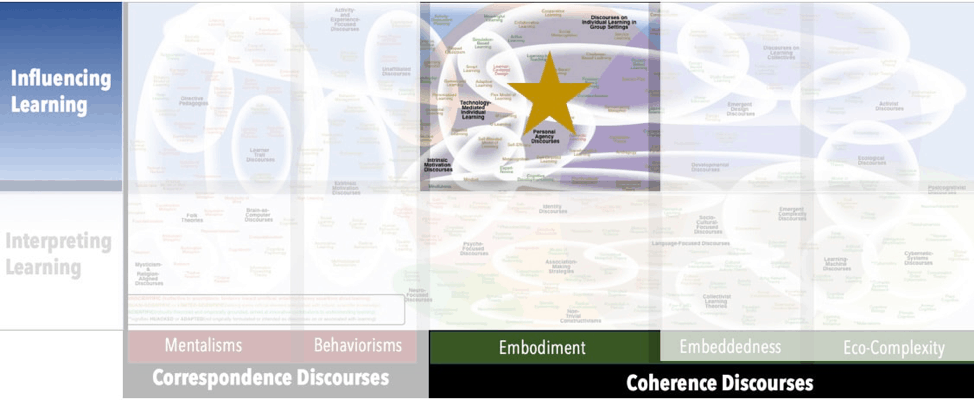Focus
Improving learning by talking through current understandingsPrincipal Metaphors
- Knowledge is … assemblage (of personally held truths)
- Knowing is … holding
- Learner is … holder
- Learning is … collecting and replacing
- Teaching is … correcting
Originated
1990sSynopsis
A Hypercorrection can occur when one learns that a strongly held truth or conviction is false or indefensible. Owing to the psychological impact of such a realization, one might resolve never to repeat the error. Some educationists have attempted to utilize this effect to encourage and consolidate student learning. Associated constructs include:- Eye Dialect (George Phillip Krapp, 1910s) – a deliberate, non-standard spelling that reflects how a word is pronounced (e.g., “potenshul” for “potential”), often in setting-specific ways (e.g., “aboot” for a central Canadian pronunciation of “about”)
- Mondegreen (Sylvia Wright, 1950s) – a misconstruing of a phrase, due to either mishearing or misunderstanding (e.g., of a song lyric, or a religious chant). Mondegreens can lead to resilient, but entirely inaccurate interpretations.
- Overregularization – errors in expression that are due to the over-generalizations of patterns of grammar or spelling (e.g., “They sowed.” → “They goed.”; “scorcher” → “torcher”)
Commentary
Hypercorrection is a familiar phenomenon that is rarely the subject of critique. However, there are criticisms of the deliberate use of Hypercorrection as a mechanism in teaching – at least, insofar as such an emphasis might involve a level of deliberate misguidance or deception by the teacher (in order to consolidate an error or convince a learner of a misconception so that it might subsequently be corrected).Authors and/or Prominent Influences
DiffuseStatus as a Theory of Learning
Hypercorrection is a specific, well-documented mechanism of learning. However, it cannot be construed as a discourse that is concerned with understanding the dynamic complexities of learning.Status as a Theory of Teaching
While a description of a specific mechanism of learning, Hypercorrection has been taken up by some as exploitable for teaching. Indeed, within the field of education, it is perhaps most often encountered as a discourse on teaching.Status as a Scientific Theory
There is no question that Hypercorrection is a common phenomenon, although its effect appears to vary dramatically across ages and levels of expertise. We do not characterize it as a “fully scientific” discourse here because it is most often presented as an uncritical description of a psychological function rather than a well-theorized principal of learning or protocol for teaching.Subdiscourses:
- Eye Dialect
- Mondegreen
- Overregularization
Map Location

Please cite this article as:
Davis, B., & Francis, K. (2022). “Hypercorrection” in Discourses on Learning in Education. https://learningdiscourses.com.
⇦ Back to Map
⇦ Back to List
